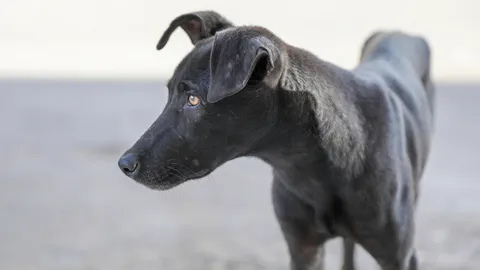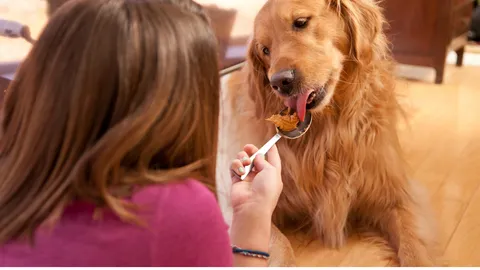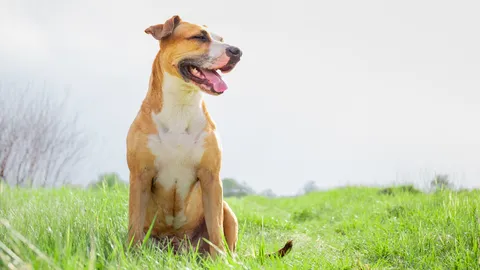Noticing your beloved canine companion losing weight can be a concerning experience for any dog owner. While a slender physique might be natural for some breeds, an unexpected drop in weight or visible ribs often signals that something is amiss. Before considering dietary changes, it’s crucial to consult your veterinarian to rule out any underlying health issues. Once your vet has given a clean bill of health, you might start wondering What Human Food Can Dogs Eat To Gain Weight effectively and safely, alongside their regular diet. This guide will explore common reasons for canine weight loss and provide expert-backed advice on how to help your dog regain a healthy weight, including safe human food options. Understanding the balance between their primary dog food and supplementary human foods is key to preventing nutritional deficiencies while helping them thrive. For a broader understanding of suitable options, you can explore what human food can dogs eat and not eat.
Before You Start: Consulting Your Veterinarian
If you’ve observed your dog looking thinner without any intentional lifestyle or diet changes, scheduling a veterinary appointment is the essential first step. Many health problems can manifest as weight loss, and addressing these underlying conditions is paramount. Your vet can conduct a thorough examination and necessary tests to identify or rule out medical causes for your dog’s weight loss. This professional assessment ensures that any dietary adjustments you make are safe and appropriate for your dog’s specific health status.
 A thin, black dog looking off into the distance
A thin, black dog looking off into the distance
Common Reasons Your Dog Might Be Underweight
Even if your dog has a good appetite, various factors can contribute to unwanted weight loss or an inability to gain weight. Understanding these common culprits can help you and your vet pinpoint the exact reason behind your dog’s lean physique.
Health Concerns
If your dog is experiencing symptoms like diarrhea, a sudden lack of appetite, or vomiting, or if they appear lethargic, these could be indicators of a health problem. While nursing mothers and older dogs might naturally lose some weight, persistent or significant weight loss, especially to the point where ribs are visible, warrants immediate veterinary attention. Medical conditions often linked to weight loss include cancer, dental problems, diabetes mellitus, food allergies, gastrointestinal disorders, kidney disease, liver disease, megaesophagus, and various parasitic infections. Early diagnosis and treatment are vital for these conditions.
Stress and Environmental Factors
Just like humans, dogs can be affected by stress. A significant change in their living situation, such as a new home, a new pet, or a major alteration in their daily routine, can lead to anxiety and a decreased appetite, ultimately causing weight loss. While many dogs adapt over time, persistent stress can hinder their ability to maintain a healthy weight. Ensuring a stable and calm environment can greatly assist their recovery.
Food Competition
In multi-dog households, food competition can be a silent saboteur of a dog’s weight. If one dog is more assertive or food-aggressive, a more timid companion might not get enough to eat, being pushed away from their bowl. Observing your dogs during mealtimes can reveal this dynamic. If you notice one dog dominating mealtime, feeding them separately might be necessary to ensure all your pets receive adequate nutrition.
How to Determine Why Your Dog is Thin
To get to the root cause of your dog’s weight loss, a comprehensive approach is recommended. Start by closely monitoring their eating habits and bowel movements. Assess their overall demeanor for any signs of illness, such as lethargy or changes in activity levels. A thorough checkup from your veterinarian is paramount to rule out any underlying medical conditions. Beyond health, examine their diet: verify recommended portions on your dog food packaging and consider supplementing if needed. Switching to a higher-calorie, nutrient-rich, or high-protein dry dog food, or a premium raw dog diet, can boost caloric intake while supporting digestive health.
Strategies to Help Your Dog Gain Weight
Once medical reasons are excluded, you can implement several strategies to help your dog safely gain weight. The goal is to increase caloric intake and nutrient absorption without compromising their health.
Optimizing Their Regular Diet
The foundation of your dog’s diet should always be a high-quality, AAFCO-compliant premium dog food. If your dog is healthy but still thin, consider upgrading to a brand they find more palatable or one specifically formulated for weight gain. These foods often have a higher fat and protein content, providing more calories per serving. Instead of just two large meals, try offering three or even four smaller servings throughout the day. This can be easier on their digestive system and ensure a steady caloric intake. Checking the label of your current dog food for protein and fat content can guide your choices, aiming for higher percentages.
Exercise: Keeping Them Active
It might seem counterintuitive when trying to add weight, but maintaining regular exercise is crucial. Exercise helps keep your dog’s system healthy and working efficiently, promoting good muscle tone rather than just fat accumulation. Dogs that lack sufficient exercise may be underweight and have poor muscle mass. If this is the case, a healthy diet rich in protein and a complete complement of amino acids, combined with daily exercise (ideally twice a day), will help build muscle. For dogs with joint pain, supplements can help reduce discomfort during activity. Remember to provide plenty of water and recovery time, especially in hot weather.
 A Golden Retriever eating peanut butter from a woman in an attempt to help the dog fatten up a bit
A Golden Retriever eating peanut butter from a woman in an attempt to help the dog fatten up a bit
What Human Food Can Dogs Eat to Gain Weight?
While your dog’s primary diet should consist of their regular dog food, certain human foods can be safely incorporated to provide a caloric boost and encourage weight gain. However, it’s vital to introduce new foods gradually and in moderation to avoid upsetting their stomach. Always ensure the human foods you offer are plain, cooked (if applicable), and free from harmful ingredients like onions, garlic, or excessive salt and sugar. Knowing what foods can’t dogs have is just as important as knowing what they can have.
Safe and Calorie-Boosting Human Foods
Several healthy human foods can be appealing to dogs and offer a good source of calories and nutrients. These can be added to their existing kibble or raw food, or given as nutritious snacks between meals. Always check with your vet before introducing new foods, especially if your dog has any health conditions or allergies. For more detailed information on healthy options, refer to what human foods are healthy for dogs.
Here are some safe options:
- Cheese: Small amounts of mild cheeses like cheddar or mozzarella can be a tasty, calorie-dense treat.
- Chicken Liver: Cooked chicken liver is highly palatable and packed with nutrients and calories.
- Cottage Cheese: Plain cottage cheese is a good source of protein and fat.
- Fish Oil: A supplement, not a food, but fish oil can add healthy fats and calories.
- Peanut Butter: Unsweetened, xylitol-free peanut butter is a popular high-fat treat.
- Pumpkin: Cooked, plain pumpkin (not pie filling) is good for digestion and adds some calories.
- Raw Meats: While some raw meats can be given, it’s crucial to ensure they are human-grade and handled properly to avoid bacterial contamination. Be aware that what meat is toxic to dogs and what meat should never be given to dogs are important considerations.
- Sweet Potato: Cooked and mashed sweet potato offers healthy carbohydrates and calories.
- Tuna: Canned tuna in water (not oil) can be a good source of protein and fat in moderation.
Vet-Prescribed Diets and Nutritional Support
Beyond general dietary adjustments, your veterinarian may recommend specific therapeutic diets designed for weight gain. These vet-prescribed foods are often formulated to be highly palatable, easy to digest, and calorie-dense. They come in various options, some tailored for dogs with specific age-related needs, others for working dogs who burn significant calories, and some specifically for those struggling to gain weight. Your vet’s expertise is invaluable in selecting the best food to ensure your dog gains weight safely and effectively while receiving complete and balanced nutrition.
Key Considerations When Feeding for Weight Gain
When aiming for weight gain, it’s essential to not only focus on what to feed but also how. Always refer to the label on your dog’s current food and any treats, paying close attention to protein and fat content. Protein is crucial for building muscle mass, while fat provides the necessary calories for energy and weight gain. Comparing labels of different brands can help you find options with higher nutritional density.
Look for high-protein and high-fat treats as well, such as dried chicken, salmon, beef, or lamb. Ensure that protein is the first ingredient listed. Just as with their main meals, carefully read the labels of any snacks to ensure they are healthy and suitable for your dog. Remember, consistency in feeding times and minimizing stress during meals can also play a significant role in encouraging a healthy appetite and weight gain.
 A white and tan dog enjoying nature with a big smile on his face
A white and tan dog enjoying nature with a big smile on his face
How to Fatten My Dog Up? Feed Them Well, Stay Active, & Check with Your Vet
As a devoted paw-parent, ensuring your dog’s well-being is a top priority. Witnessing your energetic companion become listless and lose weight can be genuinely worrying. Unless the cause is immediately obvious, the first and most crucial step is to consult your veterinarian to rule out any underlying health issues that could be life-threatening.
If your dog receives a clean bill of health, then it’s time to implement some strategic changes to help them regain a healthy weight. Ensure you are feeding them a high-quality dog food they genuinely enjoy, and consider offering healthy, high-calorie treats between meals. Maintaining a calm environment during mealtimes and keeping their daily schedule as stable as possible can also positively impact their appetite and digestion. With consistent love, affection, proper nutrition, and veterinary guidance, your dog will soon be on the path to a healthier weight, ensuring you both can share a long and happy life together.
References:
4 Ways to Fatten Up a Dog.
How To Build Muscle On A Dog With Food.
Tips for Choosing a Food for Dog Weight Gain.
